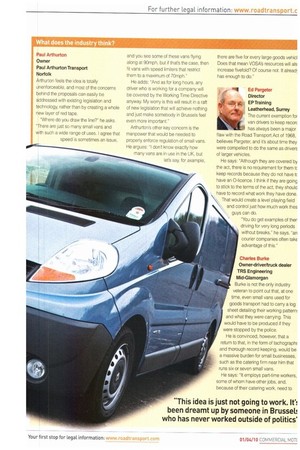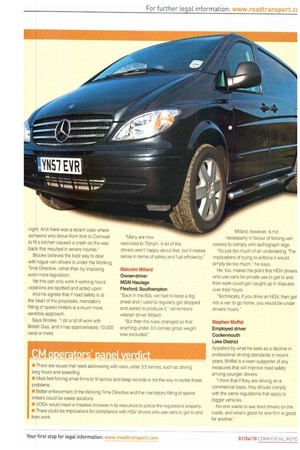Paul Arthurton Owner Paul Arthurton Transport Norfolk
Page 27

Page 28

Page 29

If you've noticed an error in this article please click here to report it so we can fix it.
Arthurton feels the idea is totally Unenforceable, and most of the concerns behind the proposals can easily be addressed with existing legislation and technology, rather than by creating a whole new layer of red tape.
"Where do you draw the line?" he asks. "There are just so many small vans and With such a wide range of uses. I agree that
speed is sometimes an issue,
and you see some of these vans flying along at 90mph, but if that's the case, then fit vans with speed limiters that restrict them to a maximum of 70mph."
He adds: "And as for long hours, any driver who is working for a company will be covered by the Working Time Directive anyway. My worry is this will result in a raft of new legislation that will achieve nothing and just make somebody in Brussels feel even more important."
Arthurton's other key concern is the manpower that would be needed to properly enforce regulation of small vans. He argues: "I don't know exactly how
many vans are in use in the UK, but let's say, for example,
there are five for every large goods vehicl Does that mean VOSA's resources will als increase fivefold? Of course not. It alread! has enough to do."
Ed Pargeter Director EP Training
Leatherhead, Surrey The current exemption for van drivers to keep recorc has always been a major flaw with the Road Transport Act of 1968, believes Pargeter, and it's about time they were compelled to do the same as drivers of larger vehicles.
He says: "Although they are covered by the act, there is no requirement for them tc keep records because they do not have tc have an 0-licence. I think if they are going to stick to the terms of the act, they shoulo have to record what work they have done. That would create a level playing field
and control just how much work thes guys can do.
"You do get examples of ther driving for very long periods without breaks," he says, "an courier companies often takE advantage of this."
Charles Burke Owner-driver/truck dealer TRS Engineering Mid-Glamorgan
Burke is not the only industry veteran to point out that, at one time, even small vans used for goods transport had to carry a log sheet detailing their working pattern: and what they were carrying. This would have to be produced if they were stopped by the police.
He is convinced, however, that a return to that, in the form of tachographE and thorough record keeping, would be a massive burden for small businesses, such as the catering firm near him that runs six or seven small vans.
He says: "It employs part-time workers, some of whom have other jobs, and, because of their catering work, need to
drive late at night. Policing the hours they work and recording them isn't going to work."
He also points out. as do other panel members, that many HGV drivers travel to and from work in a van rather than a car. If a driver then uses up his hours during the day, he will be unable to drive home afterwards if his van is fitted with a tachograph. "This idea is just not going to work. Its been dreamt up by someone in Brussels who has never worked outside of politics."
Martin Barnes Project manager Charles Gee and Co.
East liunstpill Somerset The principle behind the proposal is understandable, believes Barnes, in that a few rogue companies do exploit the loophole to allow drivers to stay on the road for dangerously long periods. But the practical implications are a nightmare.
It does need some legislation because there are too many people who will drive for five days in a van with hardly any sleep because they can. but it's totally unenforceable," he says. "For one thing, who's going to pick up the tab for retrofitting millions of vans with tachographs? And if it's to improve road safety, well, accidents don't stop happening just because you've put a tachograph in."
Chris Roe Managing director Alert 4-IGV Training Leicester Like [Paul) Arthurton. Roe believes there are issues
1/4 regarding speeding among van drivers that need to be addressed if road safety is to be improved.
Roe also agrees that there are simpler methods available to do just that, rather than forcing the whole van sector to comply with cumbersome tachograph regulations.
"Some fly around like lunatics," he says. "But there's no point putting them on tachos." Although the proposed measures would apply to business use of small vans, it's unclear how that affects hire companies renting out vehicles for private use.
That's going to further confuse matters. Roe fears.
He adds: "Hire firms will obviously up their rates if they have to fit tachographs, and that will turn people away from the van sector."
Kevin Brooke Driver agency director Recruitment Driven Wakefield, West Yorks There Ls a need for better policing of van drivers, says Brooke, but he's not convinced bringing them under tachograph regulations is the solution.
He reveals: "I know a few people from Yorkshire who would not think twice about getting up at 3am, driving to London to do a job, then driving home again that night. And there was a recent case where someone who drove from York to Cornwall to fit a kitchen caused a crash on the way back that resulted in severe injuries."
Brooke believes the best way to deal with rogue van drivers is under the Working Time Directive, rather than by imposing even more legislation.
Yet this can only work if working hours' violations are spotted and acted upon.
And he agrees that if road safety is at the heart of the proposals, mandatory fitting of speed limiters is a much more sensible approach.
Says Brooke: "I do a lot of work with British Gas, and it has approximately 10,000 vans or more. "Many are now restricted to 70mph. A lot of the drivers aren't happy about that, but it makes sense in terms of safety and fuel efficiency."
Malcolm Millard Owner-driver MGM Haulage Flexford, Southampton "Back in the 60s, we had to keep a log sheet and I used to regularly get stopped and asked to produce it," remembers veteran driver Millard.
"But then the rules changed so that anything under 3.5 tonnes gross weight was excluded." Millard, however, is not necessarily in favour of forcing van owners to comply with tachograph regs.
"It's just too much of an undertaking. The implications of trying to enforce it would simply be too much.he says,
He, too, makes the point that HGV drivers who use vans for private use to get to and from work could get caught up in disputes over their hours.
"Technically, if you drive an HGV, then get into a van to go home, you would be under drivers' hours."
Stephen Moffat Employed driver Cockermouth Lake District Appalled by what he sees as a decline in professional driving standards in recent years, Moffat is a keen supporter of any measures that will improve road safety among younger drivers.
"I think that if they are driving on a commercial basis, they should comply with the same regulations that apply to bigger vehicles.
No-one wants to see tired drivers on the roads, and what's good for one firm is good for another."






























































































































































































